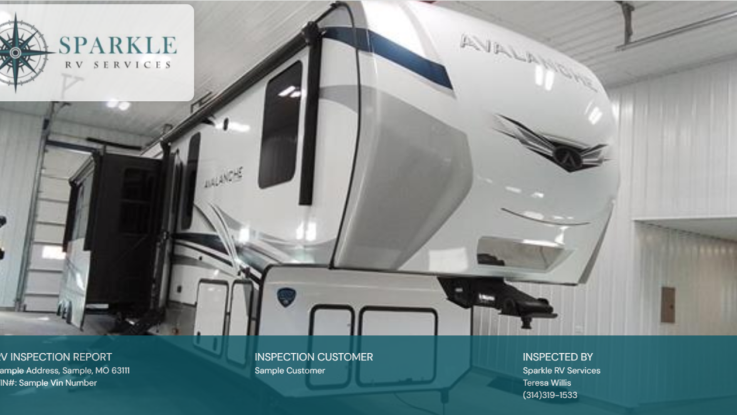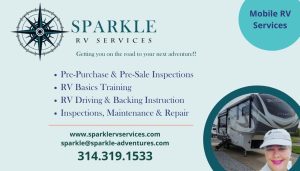
Buying an RV is an exciting adventure, but it’s also a significant investment that requires careful consideration. One of the most crucial steps in the buying process is hiring a qualified RV inspector to conduct a prepurchase inspection.
This inspection will help you understand the condition of the RV, identify any potential issues, and ensure that your investment is sound. However, not all RV inspectors are created equal, so it’s important to know what to look for.
With so many inspectors out there, how do you choose the right one? Here are some critical factors to consider when hiring an RV inspector for your prepurchase inspection.
- What is their training? Are they NRVIA certified?
The first and most important consideration when hiring an RV inspector is their training and certification. The National RV Inspectors Association (NRVIA) is a well-known organization that certifies RV inspectors who have undergone rigorous training and testing. An NRVIA-certified inspector has the knowledge and skills to thoroughly inspect all aspects of an RV, from the roof to the chassis.

When hiring an inspector, ask about their training and whether they are NRVIA certified. Certification from a recognized organization like NRVIA ensures that the inspector is up to date with industry standards and best practices.
- Do they have insurance?
Insurance is a crucial aspect of hiring an RV inspector. A professional inspector should carry liability insurance to protect both themselves and you, the client, in case something goes wrong during the inspection process. Insurance coverage provides peace of mind, knowing that you won’t be left in a difficult situation if an issue arises.
- What are their points of inspection?
Not all RV inspections are created equal. The thoroughness of an inspection can vary significantly between inspectors, so it’s essential to know what areas will be covered. A comprehensive RV inspection should include all major systems and components, such as the roof, plumbing, electrical, HVAC, appliances, and chassis.
Before hiring an inspector, ask for a detailed list of their inspection points.
- Do they offer fluid analysis?
Fluid analysis is an advanced inspection service that involves testing the fluids in the RV, such as engine oil, transmission fluid, and coolant. This analysis can provide valuable insights into the health of the RV’s mechanical systems and help identify issues that may not be apparent during a visual inspection.
- Do they have sample reports?
A professional RV inspector should be able to provide sample reports from previous inspections. Reviewing these samples will give you an idea of how thorough the inspector is and what kind of information you can expect to receive. A good report should be clear, detailed, and include photos of any issues found during the inspection.

- Do they have a website?
In today’s digital age, having a professional website is a basic requirement for any reputable business. An inspector’s website should provide detailed information about their services, qualifications, and contact details. A well-maintained website is a sign of professionalism and can give you confidence in the inspector’s capabilities.
While browsing their website, look for detailed descriptions of their inspection process, any additional services they offer, and information about their background and experience.
- Do they have reviews?
Customer reviews are one of the most reliable ways to gauge the quality of an RV inspector’s work. Look for reviews on the inspector’s website, Google, or other trusted review platforms like MyRVResource.com. Positive reviews from previous clients indicate that the inspector has a track record of providing quality service.
When reading reviews, pay attention to what customers say about the inspector’s thoroughness, professionalism, and communication skills. Consistent positive feedback is a good sign that you’re making the right choice.
- Should you hire a new RV inspector?
Hiring a new RV inspector can offer several advantages. First, new inspectors are often highly motivated to gain experience and build their portfolio, which means they may be particularly thorough and detail-oriented in their inspections. Second, many new inspectors offer discounted rates as they establish their business, allowing you to save money on your inspection. Third, hiring a newer inspector can provide a fresh perspective, as they may be more up to date with the latest training and certification requirements. Just be sure to verify their qualifications and ensure they have the proper certification before moving forward.
Relax knowing you have done your homework
Hiring the right RV inspector is a critical step in the prepurchase process. By considering factors such as training, insurance, inspection points, fluid analysis, sample reports, online presence, and reviews, you can make an informed decision that ensures your investment is protected. A thorough inspection by a qualified professional will help to make sure you buy an RV ready for your adventures instead of ready for the shop.
Safe travels and happy RVing!
|
Teresa Willis is an NRVIA-certified RV Inspector. Her company Sparkle Travel & RV Services is located in St. Louis, MO. Find RV Services on the Road at MyRVResource.com |



Leave a Reply